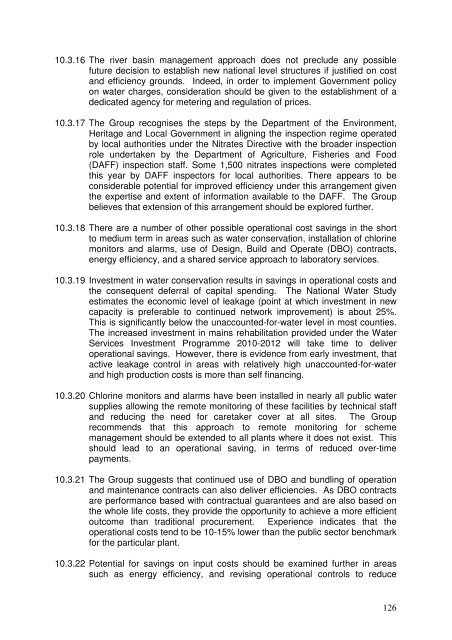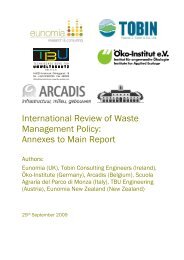Report of the Local Government Efficiency Review Group
Report of the Local Government Efficiency Review Group
Report of the Local Government Efficiency Review Group
You also want an ePaper? Increase the reach of your titles
YUMPU automatically turns print PDFs into web optimized ePapers that Google loves.
10.3.16 The river basin management approach does not preclude any possible<br />
future decision to establish new national level structures if justified on cost<br />
and efficiency grounds. Indeed, in order to implement <strong>Government</strong> policy<br />
on water charges, consideration should be given to <strong>the</strong> establishment <strong>of</strong> a<br />
dedicated agency for metering and regulation <strong>of</strong> prices.<br />
10.3.17 The <strong>Group</strong> recognises <strong>the</strong> steps by <strong>the</strong> Department <strong>of</strong> <strong>the</strong> Environment,<br />
Heritage and <strong>Local</strong> <strong>Government</strong> in aligning <strong>the</strong> inspection regime operated<br />
by local authorities under <strong>the</strong> Nitrates Directive with <strong>the</strong> broader inspection<br />
role undertaken by <strong>the</strong> Department <strong>of</strong> Agriculture, Fisheries and Food<br />
(DAFF) inspection staff. Some 1,500 nitrates inspections were completed<br />
this year by DAFF inspectors for local authorities. There appears to be<br />
considerable potential for improved efficiency under this arrangement given<br />
<strong>the</strong> expertise and extent <strong>of</strong> information available to <strong>the</strong> DAFF. The <strong>Group</strong><br />
believes that extension <strong>of</strong> this arrangement should be explored fur<strong>the</strong>r.<br />
10.3.18 There are a number <strong>of</strong> o<strong>the</strong>r possible operational cost savings in <strong>the</strong> short<br />
to medium term in areas such as water conservation, installation <strong>of</strong> chlorine<br />
monitors and alarms, use <strong>of</strong> Design, Build and Operate (DBO) contracts,<br />
energy efficiency, and a shared service approach to laboratory services.<br />
10.3.19 Investment in water conservation results in savings in operational costs and<br />
<strong>the</strong> consequent deferral <strong>of</strong> capital spending. The National Water Study<br />
estimates <strong>the</strong> economic level <strong>of</strong> leakage (point at which investment in new<br />
capacity is preferable to continued network improvement) is about 25%.<br />
This is significantly below <strong>the</strong> unaccounted-for-water level in most counties.<br />
The increased investment in mains rehabilitation provided under <strong>the</strong> Water<br />
Services Investment Programme 2010-2012 will take time to deliver<br />
operational savings. However, <strong>the</strong>re is evidence from early investment, that<br />
active leakage control in areas with relatively high unaccounted-for-water<br />
and high production costs is more than self financing.<br />
10.3.20 Chlorine monitors and alarms have been installed in nearly all public water<br />
supplies allowing <strong>the</strong> remote monitoring <strong>of</strong> <strong>the</strong>se facilities by technical staff<br />
and reducing <strong>the</strong> need for caretaker cover at all sites. The <strong>Group</strong><br />
recommends that this approach to remote monitoring for scheme<br />
management should be extended to all plants where it does not exist. This<br />
should lead to an operational saving, in terms <strong>of</strong> reduced over-time<br />
payments.<br />
10.3.21 The <strong>Group</strong> suggests that continued use <strong>of</strong> DBO and bundling <strong>of</strong> operation<br />
and maintenance contracts can also deliver efficiencies. As DBO contracts<br />
are performance based with contractual guarantees and are also based on<br />
<strong>the</strong> whole life costs, <strong>the</strong>y provide <strong>the</strong> opportunity to achieve a more efficient<br />
outcome than traditional procurement. Experience indicates that <strong>the</strong><br />
operational costs tend to be 10-15% lower than <strong>the</strong> public sector benchmark<br />
for <strong>the</strong> particular plant.<br />
10.3.22 Potential for savings on input costs should be examined fur<strong>the</strong>r in areas<br />
such as energy efficiency, and revising operational controls to reduce<br />
126
















